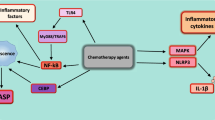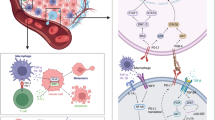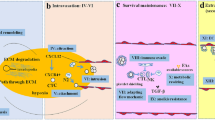Abstract
Lung cancer (LC) is the leading cause of cancer-associated deaths worldwide, among which non-small-cell lung cancer (NSCLC) accounts for 80%. Stromal cell-derived factor-1 (SDF-1) inhibition results in a significant depletion of NSCLC metastasis. Additionally, SDF-1 is the only natural chemokine known to bind and activate the receptor CXCR4. Thus, we attempted to clarify the molecular mechanism of SDF-1 underlying NSCLC progression. Transwell migration, adhesion, and G-LISA assays were used to assess megakaryocytic chemotaxis in vitro and in vivo in terms of megakaryocytic migration, adherence, and RhoA activation, respectively. Western blotting was used to assess PI3K/Akt-associated protein abundances in MEG-01 cells and primary megakaryocytes under the indicated treatment. A hematology analyzer and flow cytometry were used to assess platelet counts in peripheral blood and newly formed platelet counts in Lewis LC mice under different treatments. Immunochemistry and flow cytometry were used to measure CD41+ megakaryocyte numbers in Lewis LC mouse tissue under different treatments. ELISA was used to measure serum TPO levels, and H&E staining was used to detect NSCLC metastasis. SDF-1 receptor knockdown suppressed megakaryocytic chemotaxis in Lewis LC mice. SDF-1 receptor inhibition suppressed megakaryocytic chemotaxis via the PI3K/Akt pathway. SDF-1 receptor knockdown suppressed CD41+ megakaryocyte numbers in vivo through PI3K/Akt signaling. SDF-1 receptor inhibition suppressed CD41+ megakaryocytes to hinder NSCLC metastasis. SDF-1 facilitates NSCLC metastasis by enhancing the chemoattraction of megakaryocytes via the PI3K/Akt signaling pathway, which may provide a potential new direction for seeking therapeutic plans for NSCLC.




Similar content being viewed by others
References
Avecilla ST, Hattori K, Heissig B, et al. 2004 Chemokine-mediated interaction of hematopoietic progenitors with the bone marrow vascular niche is required for thrombopoiesis. Nat. Med. 10 64–71
Bray F, Ferlay J, Soerjomataram I, et al. 2018 Global cancer statistics 2018: GLOBOCAN estimates of incidence and mortality worldwide for 36 cancers in 185 countries. CA Cancer J. Clin. 68 394–424
Broxmeyer HE 2008 Chemokines in hematopoiesis. Curr. Opin. Hematol. 15 49–58
Chen J, Li F, Xu Y, et al. 2019 Cholesterol modification of SDF-1-specific siRNA enables therapeutic targeting of angiogenesis through Akt pathway inhibition. Exp. Eye Res. 184 64–71
Cheng ZH, Shi YX, Yuan M, et al. 2016 Chemokines and their receptors in lung cancer progression and metastasis. J. Zhejiang Univ. Sci. B 17 342–351
Dhanjal TS, Pendaries C, Ross EA, et al. 2007 A novel role for PECAM-1 in megakaryocytokinesis and recovery of platelet counts in thrombocytopenic mice. Blood 109 4237–4244
Ding S, Wang M, Fang S, et al. 2018 D-dencichine regulates thrombopoiesis by promoting megakaryocyte adhesion, migration and proplatelet formation. Front. Pharmacol. 9 297
Gomes AL, Carvalho T, Serpa J, et al. 2010 Hypercholesterolemia promotes bone marrow cell mobilization by perturbing the SDF-1:CXCR4 axis. Blood 115 3886–3894
Guo T, Wang X, Qu Y, et al. 2015 Megakaryopoiesis and platelet production: insight into hematopoietic stem cell proliferation and differentiation. Stem Cell Investig. 2 3
Hoxhaj G and Manning BD 2020 The PI3K-AKT network at the interface of oncogenic signalling and cancer metabolism. Nat. Rev. Cancer 20 74–88
Huang W, Zhao S, Xu W, et al. 2019 Presence of intra-tumoral CD61+ megakaryocytes predicts poor prognosis in non-small cell lung cancer. Transl. Lung Cancer Res. 8 323–331
Huang X, Wu P, Huang F, et al. 2017 Baicalin attenuates chronic hypoxia-induced pulmonary hypertension via adenosine A(2A) receptor-induced SDF-1/CXCR4/PI3K/AKT signaling. J. Biomed. Sci. 24 52
Hung HY, Wu LM and Chen KP 2018 Determinants of quality of life in lung cancer patients. J. Nurs. Scholarsh. 50 257–264
Jiang R and Long H 2015 Platelets and erectile dysfunction. Zhonghua Nan Ke Xue 21 771–774
Kowalska MA, Ratajczak J, Hoxie J, et al. 1999 Megakaryocyte precursors, megakaryocytes and platelets express the HIV co-receptor CXCR4 on their surface: determination of response to stromal-derived factor-1 by megakaryocytes and platelets. Br. J. Haematol. 104 220–229
Lane WJ, Dias S, Hattori K, et al. 2000 Stromal-derived factor 1-induced megakaryocyte migration and platelet production is dependent on matrix metalloproteinases. Blood 96 4152–4159
Lefrançais E, Ortiz-Muñoz G, Caudrillier A, et al. 2017 The lung is a site of platelet biogenesis and a reservoir for haematopoietic progenitors. Nature 544 105–109
Mellado M, Rodríguez-Frade JM, Mañes S, et al. 2001 Chemokine signaling and functional responses: the role of receptor dimerization and TK pathway activation. Annu. Rev. Immunol. 19 397–421
Mikkola HK, Fujiwara Y, Schlaeger TM, et al. 2003 Expression of CD41 marks the initiation of definitive hematopoiesis in the mouse embryo. Blood 101 508–516
Nasser MW, Elbaz M, Ahirwar DK, et al. 2015 Conditioning solid tumor microenvironment through inflammatory chemokines and S100 family proteins. Cancer Lett. 365 11–22
Nguyen-Kim TD, Frauenfelder T, Strobel K, et al. 2015 Assessment of bronchial and pulmonary blood supply in non-small cell lung cancer subtypes using computed tomography perfusion. Invest. Radiol. 50 179–186
Otsuka S and Bebb G 2008 The CXCR4/SDF-1 chemokine receptor axis: a new target therapeutic for non-small cell lung cancer. J. Thorac. Oncol. 3 1379–1383
Prislovsky A, Marathe B, Hosni A, et al. 2008 Rapid platelet turnover in WASP(-) mice correlates with increased ex vivo phagocytosis of opsonized WASP(-) platelets. Exp. Hematol. 36 609–623
Ren DW and Liu WJ 2018 Regulation of the megakaryocyte development and the platelet production–review. Zhongguo Shi Yan Xue Ye Xue Za Zhi 26 1876–1880
Schabath H, Runz S, Joumaa S, et al. 2006 CD24 affects CXCR4 function in pre-B lymphocytes and breast carcinoma cells. J. Cell Sci. 119 314–325
Skřičková J, Kadlec B and Venclíček O 2018 Non-small cell lung cancer. Vnitr Lek 63 861–874
Suster DI and Mino-Kenudson M 2020 Molecular pathology of primary non-small cell lung cancer. Arch. Med. Res. 51 784–798
Szalai G, LaRue AC and Watson DK 2006 Molecular mechanisms of megakaryopoiesis. Cell Mol. Life Sci. 63 2460–2476
Tan AC 2020 Targeting the PI3K/Akt/mTOR pathway in non-small cell lung cancer (NSCLC). Thorac. Cancer 11 511–518
Xiu G, Li X, Yin Y, et al. 2020 SDF-1/CXCR4 Augments the therapeutic effect of bone marrow mesenchymal stem cells in the treatment of lipopolysaccharide-induced liver injury by promoting their migration through PI3K/Akt signaling pathway. Cell Transplant 29 1–12
Yang J, Luan J, Shen Y, et al. 2021 Developments in the production of platelets from stem cells (Review). Mol. Med. Rep. 23
Zeng J, Xie K, Wu H, et al. 2012 Identification and functional study of cytokines and chemokines involved in tumorigenesis. Comb. Chem. High Throughput Screen. 15 276–285
Author information
Authors and Affiliations
Corresponding author
Ethics declarations
Ethics statement
This study was approved by the Ethics Committee of the Second Affiliated Hospital of Shantou University Medical College.
Additional information
Corresponding editor: Ramray Bhat
Rights and permissions
Springer Nature or its licensor (e.g. a society or other partner) holds exclusive rights to this article under a publishing agreement with the author(s) or other rightsholder(s); author self-archiving of the accepted manuscript version of this article is solely governed by the terms of such publishing agreement and applicable law.
About this article
Cite this article
Ai, Y., Wan, C., Chen, Z. et al. SDF-1 promotes metastasis of NSCLC by enhancing chemoattraction of megakaryocytes through the PI3K/Akt signaling pathway. J Biosci 49, 55 (2024). https://doi.org/10.1007/s12038-023-00393-9
Received:
Accepted:
Published:
DOI: https://doi.org/10.1007/s12038-023-00393-9




